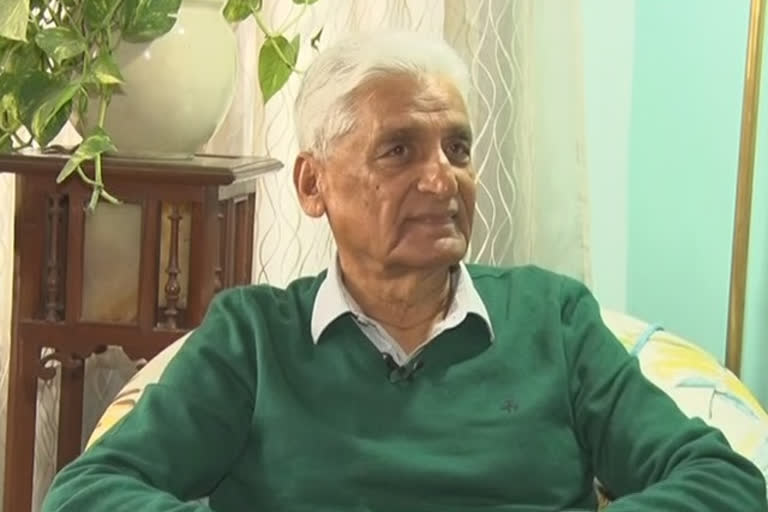New Delhi: Former Air Chief Marshal AY Tipnis, who led IAF in Kargil war, hailed air strikes at Jaish-e-Mohammad's terror launch pad in Balakot region in the wee hours on Tuesday by India. Talking exclusively to ETV Bharat, Tipnis described the act as a paradigm shift in the country’s policy and political will.
He said, “It is for the first time that our action has been pro-active and not reactive. Our political will made that happen. There has been a major change and now we can say, yes we can do it and we will continue to do it. We are bent upon strengthening the security of our nation.”
Tipnis added, “We hit them and hit them hard. The operation has caused enormous damage at one of the biggest terror camps in Pakistan, but no collateral damage.”
On the escalating tension between India and Pakistan, Tipnis said, “There is no fear of conflict escalating into a nuclear war. Nuclear war is unthinkable. It is just a Pakistan bluff. They cannot strike us with a nuke, as India will certainly retaliate. We have a policy of nuclear deterrent. But if they strike, we will strike back hard and they do not have second strike capability."

He added, "If they hit us, we will cry for some time. But when we retaliate, there would be no one left in Pakistan to cry. It will be finished and they know this. So there is no question of nuclear war between the two countries.”
Tipnis said India should be prepared for a war and ensure that the army had all required equipments, weapons, arms and ammunition.
"Right now, the army does not have as much resources as needed. Our squadron strength is also much below the sanctioned strength of 42. India needs to strengthen its army to be in a strong position in any eventuality,” he said.
Tipnis stressed that the nation needed a grand strategic plan, which should remain in place, no matter which party comes to power. “Pakistan is not going to change its course. It cannot be corrected and threats will continue to increase. We need to maintain this momentum to guard our nation with assertiveness,” he said.

Regarding the IAF strikes at Balakot, he said, it was a meticulously planned operation. Gwalior base was chosen to maintain secrecy and stealth, which is very important in such operations. The distance that Indian jets travelled was around 80 kilometers and the speed is about 15 kilometers per minute.
“Our pilots flew in a very difficult mountainous terrain and also did tactical routing, hence they were probably there in Pakistan skies for around one hour,” he estimated based on his experience.
He added that if the Air Force had Rafale fighter jets, things would have been easier while striking at Balakot as Rafale had terrain following radars which Mirage did not have.
On asked, whether he felt constrained during the Kargil war due to India’s decision to not cross the LoC, he said, “If we were allowed like this time, Kargil war would have finished much earlier. Without these restriction, action would have been much faster.”

Tipnis lamented that India lost a number of opportunities in the past seventy years due to lack of political will and made several mistakes.
He said, “Our initial diplomatic moves were totally wrong. In 1948, our army had pushed Pakistan forces back out of entire Jammu and Kashmir and there would have been no PoK had the then government not decided to call back the forces."
He added, "In 1965, our forces captured dominating positions but were again called back. In 1971, Pakistan army surrendered, yet we didn’t bargain. Our armed forces sacrificed so much to attain victories but the politicians never used those successes to exert diplomatic pressure for national interest. We lost several opportunities due to lack of political will.”
Also read:If US can kill Laden in Abbottabad, so could India: Jaitley on IAF's airtrsike on JeM camp



